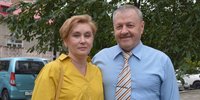The Case of Valeriy Rabota in Knyaze-Volkonskoye
Filter
- #
A. A. Kozlov, Senior Investigator of the Investigative Directorate for Komsomolsk-on-Amur of the Investigative Directorate of the Investigative Committee of Russia for the Khabarovsk Territory, decides to initiate a criminal case on the grounds of a crime under Part 1 of Article 282.2 of the Criminal Code of the Russian Federation against Valery Rabota.
- #
Investigator Kozlov A. A. makes a decision to search the home of Valery Rabota. Phones, a laptop and data carriers are seized from the believer. After the search, Valeriy is interrogated and placed in a temporary detention facility in Khabarovsk.
- #
Investigator Kozlov A.A. requests a measure of restraint in the form of detention for Valery Rabota until 01.05.2022.
- #
The judge of the Khabarovsk District Court of the Khabarovsk Territory Karnaukh T.V. chooses a measure of restraint for Valery Rabota in the form of detention until 04/30/2022. Valery objects to the measure of restraint, explaining that "the investigator said that after the search and testimony he would be released home, but after he took advantage of the provision of Article 51 of the Constitution of the Russian Federation, he was informed that he would be detained because he did not want to cooperate." The suspect's lawyer expresses confidence that "the very fact of choosing a measure of restraint is used by the investigator not as a measure of restraint, but as a measure of intimidation, since he refused to testify against himself and his relatives."
- #
The defense of Valery Rabota is filing two appeals against the court's decision to choose a measure of restraint in the form of detention.
- #
Investigator A. A. Kozlov attracts Valery Rabota as a defendant under Part 1 of Article 282.2 of the Criminal Code of the Russian Federation.
- #
The lawyer visits Valery Rabota in SIZO-1 in Khabarovsk. According to the lawyer, his health and mood are generally positive, but sometimes he is worried about exacerbations of chronic diseases. Recently, Valeriy was transferred to a 4-bed cell. He had a good and respectful relationship with his cellmates. He receives parcels and parcels, he also has a Bible.
- #
Judge of the Khabarovsk District Court of the Khabarovsk Territory Zhigulina G. K. refuses to satisfy the petition of investigator Kozlov A.A. to extend the period of detention for Valeriy Rabota and decides to choose a measure of restraint against the believer in the form of house arrest for a period of one month, that is, until July 28, 2022 inclusive.
- #
The case goes to the Khabarovsk District Court of the Khabarovsk Territory. It will be considered by judge Angelina Sviderskaya.
- #
The prosecutor begins the hearing by questioning the witness Martyn. He explains that he communicated with the defendant in 2021-2022, and then "stopped communicating and simply disappeared." The court satisfies the prosecutor's request to read out the testimony of the witness, since the year 2020 was indicated in the interrogation protocol. The witness confirms his testimony given during the preliminary investigation.
Although Martyn has a law degree, he does not understand the difference between a legal entity and a group of believers. He gives a positive characterization of the defendant.
- #
One of the prosecution witnesses states that, on the instructions of the FSB, he introduced the informant Martyn to believers. According to him, he did this because of threats from an employee of the service Ogienko A.A. to his wife. The witness states that the record of the interrogation does not contain the testimony that he gave to the investigator.
- #
The witness Romanov, who has known Valery Rabota for about 20 years, is being interrogated. According to Romanov, the believer spoke to him about his beliefs several times before 2017. The witness considers Valeriy to be a man "good, polite, hardworking."
- #
Another prosecution witness states that the words in the interrogation record do not correspond to her testimony.
- #
FSB officer Ogienko is being questioned as a witness for the prosecution. He says that he does not know the difference between the concepts of denomination, legal entity and religious group, since he does not have a legal education. According to him, when drawing up the interrogation protocol, he copied these terms from the recommendations of higher authorities.
- #
At the prosecutor's request, the court listens to recordings of conversations about the Bible with Martyn.
- #
Listening to the recording of Bible discussions at the worship service continues.
The prosecutor concludes the presentation of evidence.
- #
The defense submits to the court the ECHR rulings and expert opinions confirming that Jehovah's Witnesses are not involved in extremism. The lawyer also petitions for the attachment of the decision of the ECHR of June 7, 2022, which recognized the criminal prosecution of Jehovah's Witnesses in Russia as unjustified and illegal. The judge attaches the document to the case file.
The meeting was attended by 17 listeners who came to support the believer.
- #
The defense examines material evidence—reference books and various translations of the Bible.
- #
The defense is requesting the exclusion of the evidence provided by the prosecution: the conclusion of a psychologist and the survey of a religious scholar. These documents were drawn up even before the initiation of the criminal case. The court dismisses the petition.
Valery Rabota testifies.
- #
The prosecutor asks to find Valeriy Rabota guilty under Part 1.1 and Part 2 of Article 282.2 of the Criminal Code of the Russian Federation and to sentence him to 6 years in a general regime colony and 1.5 years of restriction of liberty.
The defense asks to acquit the defendant.
- #
Judge Angelina Sviderska reports that she is recusing herself. The case of Valeriy Rabota will be re-examined by a different composition of the court.
The judge explained her decision by the fact that she had previously considered a similar criminal case against Lyubov Ovchinnikova and Lyubov Kocherova. Both cases involved the same witnesses, and she had already assessed their testimony.
- #
Hearings in the case of Valery Rabota in the new composition of the court begin. The case is being considered by judge Maria Luzhbina.
- #
Prosecution witnesses are summoned to court. One of them talks about his acquaintance with the embedded FSB agent Stanislav Martyn, who collected information about Valery Rabota. His testimony given during the preliminary investigation is announced, the witness himself does not confirm them.
The next to be questioned is the witness Romanov, who knows the defendant well. According to him, he did not speak negatively about other religions and they talked about the Bible for a long time - in the period from 2008 to 2012.
- #
A witness for the prosecution, a neighbor of Valery Rabota, is being interrogated. She describes him as a calm, balanced person, not seen in conflicts, and notes that Valery helped her with the housework. They did not talk about religious topics. The court reads out her affidavit, the woman does not confirm them.
FSB officer Ogienko, who conducted the ORM, is also being interrogated. He explains that he did not personally witness any crime on the part of Valery; I have not heard any statements related to inciting enmity and hatred towards any religious group or nation.
- #
Interrogation of witness Sergei Gvardeev, head of the FSB department. He informs the court that he has no dislike for the defendant. He notes that he does not have a legal education and does not understand the difference between a legal entity and a religious denomination. The decision of the Supreme Court to ban the religious organization of Jehovah's Witnesses has not been read.
The last to be interrogated is Stanislav Martyn, who recorded meetings of believers on a dictaphone. When asked by the court whether he confirmed his testimony that Valery "persuaded him to make a decision to join the banned organization of Jehovah's Witnesses," Martyn replied in the negative.
About the believer himself, he says: "As much as I talked with him, a good family man, he works, he did not notice any aggression in anyone's direction. I rate it positively."
- #
At the request of the prosecutor, investigator A. I. Grishkevich, who initiated the case against Kocherova and Ovchinnikova, is interrogated.
The court proceeds to the evidence of the defense, including the recording of the worship service on the topic "Why be guided by the Bible?".
- #
The court listens to discs with recordings of conversations of believers on biblical and everyday topics.
- #
The Court continues to consider the evidence of the defense, including ECHR decisions and expert opinions.
- #
The court examines material evidence – books seized during the search, Bible reference books and various translations of the Bible. These publications are not included in the Federal List of Extremist Materials.
Valeriy Rabota testifies on the charge.
- #
The closing arguments begin. The prosecutor asks to impose a sentence of 6 years in prison with restriction of freedom for 1 year for Valeriy.
- #
- #
An appeal hearing in the case of Valeriy Rabota is underway. The prosecutor continues to insist on a punishment for the believer in the form of 6 years in prison, considering the sentence of the first instance too lenient.
During the debate, the lawyer draws attention to the violations that were committed during the proceedings by the court of first instance. Thus, the court recognized as admissible evidence the opinion of a psychologist, which was made even before the initiation of the criminal case. The lawyer explains that this specialist expressed his personal opinion and it is impossible to verify the methods used to conduct the study. In addition, the specialist gave answers to legal questions, which is not within his competence, and did not disclose the essence of the concepts to which he referred in his conclusion.
The lawyer also says that during the court hearings, prosecution witness Martyn did not confirm the fact that Valery Rabota, through persuasion and persuasion, persuaded him to join a banned religious organization. The defense also notes that it is not clear from the verdict where Article 28 of the Constitution of the Russian Federation, which guarantees freedom of religion, ends, and Article 282.2 of the Criminal Code begins.
8 people come to the meeting to support the believer.
- #


